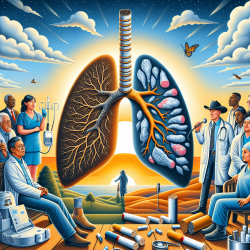Unveiling the Hidden Potential of Lung Cancer Screening in SUD Healthcare Settings
In the realm of healthcare, particularly for those serving individuals with Substance Use Disorders (SUDs), lung cancer screening (LCS) remains a critical yet underutilized tool. The recent study titled Lung Cancer Screening Eligibility and Referral Practices in Texas Organizations Serving People with Substance Use Disorders highlights the pressing need for intervention and implementation efforts to enhance screening practices within these settings.
Understanding the Current Landscape
The study conducted a statewide needs assessment survey in Texas, focusing on organizations that provide treatment to individuals with SUDs. The findings were startling: only 8.8% of respondents indicated that their healthcare providers made referrals for LCS, and a mere 3.2% assessed eligibility without making referrals. This is despite the fact that individuals with SUDs have significantly higher smoking rates, making them a priority population for LCS.
Why Lung Cancer Screening Matters
Lung cancer remains the leading cause of cancer deaths, with smoking being the primary risk factor. Early detection through LCS can significantly reduce mortality rates, yet many high-risk individuals, particularly those with SUDs, are not being screened. The United States Preventive Services Task Force (USPSTF) recommends LCS for individuals aged 50 to 80 years with a significant smoking history, emphasizing the importance of screening in early detection and prevention.
Challenges and Opportunities
The study identified several barriers to effective LCS implementation in SUD healthcare settings:
- Lack of prescribing professionals in certain centers, limiting referral capabilities.
- Inadequate integration of LCS into existing tobacco control programs.
- Limited awareness and education about LCS among healthcare providers and patients.
However, these challenges also present opportunities. By leveraging existing tobacco control efforts, organizations can integrate LCS eligibility assessments and referrals into their routine practices. Additionally, providing education and resources to both providers and patients can enhance awareness and increase screening rates.
Actionable Steps for Practitioners
To improve LCS practices, practitioners should consider the following steps:
- Assess your organization's current LCS practices and identify gaps.
- Ensure that healthcare providers are trained and equipped to assess LCS eligibility and make referrals.
- Incorporate LCS discussions into tobacco cessation programs, emphasizing the importance of early detection.
- Collaborate with community and academic partners to enhance resources and support for LCS initiatives.
Conclusion
Enhancing LCS practices in SUD healthcare settings is not just a possibility; it's a necessity. By addressing the barriers and leveraging existing tobacco control efforts, healthcare providers can play a pivotal role in increasing LCS rates and improving outcomes for individuals with SUDs. For a deeper dive into the research, I encourage you to read the original study.
To read the original research paper, please follow this link: Lung Cancer Screening Eligibility and Referral Practices in Texas Organizations Serving People with Substance Use Disorders.










